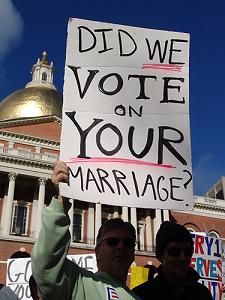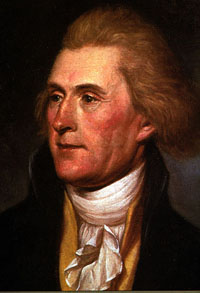 In keeping with our current events theme…
In keeping with our current events theme…
This past week witnessed a resurgence of debate over the issue of gay marriage. These discussions have reignited the controversy surrounding the Federal Marriage Amendment (FMA), a proposed addition to the United States Constitution which would limit marriage in the United States to unions of one man and one woman. This proposal also prevents the judicial extension of marriage rights and medical benefits to same-sex couples. After failing to pass the FMA at a national level in 2006, proponents shifted their focus to limiting the rights of homosexuals at the state level.
Five years later the debate rages on and it is impossible not to compare the current plight of the gay community to previous trials of suffrage and segregation. Whereas prejudice once ruled over race and gender, it now presides over sexual preference. History therefore shows us that it is only a matter of time before the civil rights of homosexuals will be recognized as being equal to their heterosexual neighbors. Until then, America will continue its longstanding hypocrisy of preaching freedom for all, while simultaneously depriving it from a portion of its own citizens.
Often times those engaged in these pseudo-moralistic debates attempt to gain the upper hand by calling on the wisdom of the Founding Fathers. This is done in a vain attempt to bolster their side of the argument while bringing confidence to their cause. More often than not, the revealing nature of the Founder’s views prevents either side from claiming their endorsement. Adding to this folly is the vast misconception that the Founders were somehow our contemporaries and would share our same perceptions. The reality is that they lived in a very different world and any attempt to draw a parallel between them (then) and us (now) is completely illogical.
One of the more difficult revelations to accept when examining the Founding Fathers is that they were wrong. As brilliant and admirable as these men were, they were mere mortals, capable of making mistakes, or worse, perpetrating ignorance. Among their character flaws were chauvinism, bigotry and prejudice. These of course were standard principles for the period, but nevertheless they are to be condemned. It is only when we acknowledge the Founder’s primitive views on women and minorities that we can truly see how far we have come. And although the same cannot yet be said for the gay community, they have also traversed a remarkable distance from where we started as a nation. Believe it or not there was a time in American history when homosexuality was recognized as a capital crime, punishable by death.
In 1976 Louis Compton, a faculty member at the University of Nebraska published a study titled “Homosexuals and the Death Penalty in Colonial America.” (Read PDF here) The abstract of this paper states that the article traces the legislative history of statutes prescribing the death penalty for sodomy in 17th-century New England and in the other American colonies. His introduction follows:
As the nation prepares to celebrate the bicentennial of the Declaration of Independence, the question of the status of the homosexual in pre-Revolutionary America comes to mind. The Body of Liberties approved by the Colony of Massachusetts Bay in 1641 welcomed refugees seeking to escape “the Tiranny or oppression of their persecutors” or famines or wars. For several hundred years America was to serve as a haven for minorities threatened with religious or political persecution in other lands. What then did it offer the homosexual? Not, assuredly, liberty or the pursuit of happiness. Indeed, it appears that in 1776 male homosexuals in the original 13 colonies were universally subject to the death penalty, and that in earlier times, for a brief period in one colony, lesbians had been liable to the same punishment for relations with other women. The following essay is an attempt to trace the capital laws against homosexuals in these colonies from their origin in the first settlements until their abolition after the Revolution.
The first official statute against homosexuality cited by Compton was passed by British Parliament in 1533 under King Henry VIII. This law made it a capital felony for anyone to “commit the detestable and abominable vice of buggery with mankind…” Although the act was repealed and re-enacted on multiple occasions, it was later reinstated by Queen Elizabeth in 1563 and remained relatively unchanged until 1861. Only then was the mandatory death penalty dropped in favor of life imprisonment. English Continental law, following the biblically influenced canon-law also included lesbian-acts in its list of offenses. As the British Empire spread across the Atlantic Ocean to the American colonies, five of the pre-revolutionary settlements in the south adopted variations of the English law. Northern colonies however developed their own Puritan-influenced version which eventually led the way for America’s unique legal-style.
In 1641, the Bay Colony adopted a new “Body of Laws and Liberties” which included 12 capital crimes to include sodomy. The inclusion of the Old Testament language contained in the Book of Leviticus (20:13) reveals the 2,000+ year of influence that permeated this statute. The verse states: “If any man lyeth with mankinde as he lyeth with a woman, both of them have committed abhomination, they both shall surely be put to death.” Known for their religious superstitions the Puritans felt that their claims in the New World could be taken by God if they failed to uphold their biblical principles and left “sexual criminals” unpunished. These anti-deviate laws remained in one form or another and continued to spread in unison with the colonies expansion. (Surprisingly England and France eventually lifted all references to illegal sodomy in 1791 in the wake of the Declaration of the Rights of Man, which had maintained that “liberty consists in the power to do anything that does not injure others” and that “the law has the right to forbid only such actions as are injurious to society.”)
 Fast forward to 1779 when Virginia Governor Thomas Jefferson established a committee tasked with reforming VA’s criminal codes. While presenting his manuscript titled “Bill Proportioning Crimes and Punishments” Jefferson explained that a number of existing penalties would be excluded under the Bill of Rights which forbid cruel and unusual punishments. This antiquated concept of proportional punishments mimicked an ‘eye-for-an-eye’ in which poisoners were poisoned, maimers maimed, and sodomites castrated. On June 18, 1779 Jefferson’s committee put forth a bill that stated “whosoever shall be guilty of Rape, Polygamy, or Sodomy, with man or woman, shall be punished, if a man, with castration, if a woman, by cutting thro' the cartilage of her nose a hole of one half inch diameter at the least.” The Virginia legislation never adopted Jefferson’s bill and when a revised code was released in 1792, sodomy was once again identified as a capital offense punishable by death.
Fast forward to 1779 when Virginia Governor Thomas Jefferson established a committee tasked with reforming VA’s criminal codes. While presenting his manuscript titled “Bill Proportioning Crimes and Punishments” Jefferson explained that a number of existing penalties would be excluded under the Bill of Rights which forbid cruel and unusual punishments. This antiquated concept of proportional punishments mimicked an ‘eye-for-an-eye’ in which poisoners were poisoned, maimers maimed, and sodomites castrated. On June 18, 1779 Jefferson’s committee put forth a bill that stated “whosoever shall be guilty of Rape, Polygamy, or Sodomy, with man or woman, shall be punished, if a man, with castration, if a woman, by cutting thro' the cartilage of her nose a hole of one half inch diameter at the least.” The Virginia legislation never adopted Jefferson’s bill and when a revised code was released in 1792, sodomy was once again identified as a capital offense punishable by death.
Individual states began repealing similar rulings at a state level and in 1873, (12 years after England had dropped it) South Carolina became the last and final state in America to eliminate the death penalty in favor of an up-to 5-year prison sentence for homosexual acts. This proclamation ended two centuries of capital punishment for having same sex relations in the United States. There are two incidents of executions included in Compton’s paper. The first was the case of a gay Virginian named William Cornish who was caught having sexual relations with a man, sentenced, and killed in 1625. (No data exists on his partner.)The second was the hanging of another homosexual named William Plain at Guilford in 1646. Both of these citizens paid dearly for their taboo lifestyles. Fortunately as the nation progressed so did their perceptions of crime and punishment. Still this evolving mindset did nothing for the day-to-day lives of homosexuals who were forced to live in secret. Compton’s own retrospective summarizes the plight of the gay community in colonial times:
America's capital laws must have created a psychological reign of terror for the homosexual in the 17th and 18th centuries. Discrimination could be justified by pointing to the death penalty as a sign of the intensity of society's disapprobation. Presumably, few homosexuals emigrated to America with Puritan settlers. But there is no reason to suppose that America's first colonists had fewer homosexual sons and daughters than any other group. For these young people, “growing up gay” in the land of the free must have been a brutalizing experience.
Recognizing our nation’s penchant for righting wrongs, it’s hard to believe that government-endorsed ‘homophobia’ continues to exist in the 21st-century. Whereas we once looked down upon our fellow citizens for their gender or skin color, we wouldn’t think of condoning the practice of sexism or racism today. Unfortunately we cannot say the same for our homosexual neighbors who continue to demand representation. Only time will tell if same-sex marriage is the next milestone in the progression of American culture. Our collective history has shown that equality can be accomplished through tolerance. Despite our differences over lifestyles and beliefs we must live up to the principals of freedom put forth by our Founding Fathers, even if they didn't. Only then can we honestly claim to live in a country that offers liberty, and justice for all.
Updated: Wednesday, 25 May 2011 8:51 AM EDT
Permalink | Share This Post





